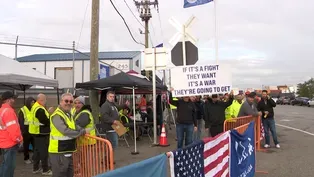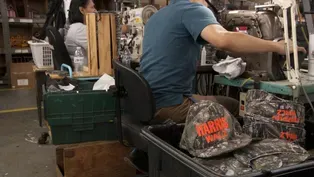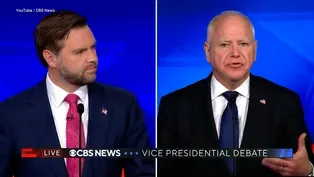NJ Spotlight News
Implications of Iran's missile strike on Israel
Clip: 10/2/2024 | 5m 58sVideo has Closed Captions
Interview: Trita Parsi of the Quincy Institute for Responsible Statecraft
NJ Spotlight News spoke with Trita Parsi, co-founder of the Quincy Institute for Responsible Statecraft, about the implications of the latest actions and the United States' role.
Problems with Closed Captions? Closed Captioning Feedback
Problems with Closed Captions? Closed Captioning Feedback
NJ Spotlight News is a local public television program presented by THIRTEEN PBS
NJ Spotlight News
Implications of Iran's missile strike on Israel
Clip: 10/2/2024 | 5m 58sVideo has Closed Captions
NJ Spotlight News spoke with Trita Parsi, co-founder of the Quincy Institute for Responsible Statecraft, about the implications of the latest actions and the United States' role.
Problems with Closed Captions? Closed Captioning Feedback
How to Watch NJ Spotlight News
NJ Spotlight News is available to stream on pbs.org and the free PBS App, available on iPhone, Apple TV, Android TV, Android smartphones, Amazon Fire TV, Amazon Fire Tablet, Roku, Samsung Smart TV, and Vizio.
Providing Support for PBS.org
Learn Moreabout PBS online sponsorshipIsrael's Prime Minister, Benjamin Netanyahu, is vowing to punish Iran for a missile strike on Tuesday, where roughly 180 ballistic missiles were fired, according to the Israeli military, spending millions of people across Israel into bomb shelters.
Iran said the missile attack was retaliation for the assassinations of two Hezbollah leaders and an Iranian commander.
Israel's air defenses blocked most of the incoming fire with the help of Western allies like the U.S..
But one Palestinian man was confirmed killed in the occupied West Bank, and two others were wounded by shrapnel in Tel Aviv.
That's according to Israel's emergency service.
The attack came a day after Israeli forces began a ground invasion of southern Lebanon, targeting the Iranian backed militia Hezbollah.
President Biden is also pledging full support of Israel in its next steps.
For more on what that might look like, I'm joined by Trita Parsi.
He's the co-founder of the Quincy Institute for Responsible Statecraft.
Treat.
It seems like every time we talk, we discuss the escalating tensions in the Middle East, but this feels different.
What was Iran's intention here?
It certainly is different this time around.
After the Israelis, attacked Lebanon, killed Nasrallah, as well as a senior Iranian official on top of around 900 people that were also killed in the same attack were overwhelming civilians.
The Iranians decided to, respond, but they did respond in a different way from what they did in April.
In April, they sent around 300 projectiles, and most of them were slow flying drones designed to be shot down.
They only got nine missiles through Israel's air defenses, all hitting, military sites that they had already signaled before in order to avoid further escalation.
This time around, the used hypersonic missiles.
And then the footage that people have put on Twitter shows that a very large number of them actually made it through.
We do not know what the actual damage was because the Israelis doesn't allow reporting of that.
There's a military censorship there that doesn't allow reporting on military damage, including as to whether there were any casualties.
I think there's a couple of reasons why the Iranians did this.
You had a message from Jared Kushner that essentially said that the success of Israel in Lebanon, by taking out Nasrallah, had shown that Iran was a paper tiger, that Hezbollah was about to be destroyed and that Israel should go full force.
And this was an opportunity to transform the Middle East.
I hope their viewers are very sensitive to the language of transforming the Middle East.
This is the kind of language that's got us into Iraq in the first place, and has only delivered disaster for the region and for the United States.
Then you also had Netanyahu issuing a video message to the Iranian people, although it was in English with English subtitles, essentially saying that the regime in Iran is going to fall, telegraphing that he is going to attack Iran.
He did the same to the Lebanese people before attacking Lebanon, the same to the people of Gaza, before attacking Gaza.
So I think the Iranians drew the conclusion that, combined with the fact that the Biden administration has either been unwilling or incapable of stopping, Netanyahu, that Israel was going to attack Iran unless Iran showed its capabilities and its willingness to strike back, and as a result, send a message that it will be very costly if Israel declares a full scale war against Iran.
And so what response might we see now from Israel?
We know that they're vowing to retaliate the U.S. as well.
I mean, this has shifted from a war between proxies to now to a regional powerhouses.
Yes.
This is now increasingly starting to look as if it will be a direct war between Israel and Iran.
And the Israelis have vowed to do a very, very strong, punishing response.
The question is, will they target Iranian civilian infrastructure, oil refineries, economic targets?
If that's the case, the Iranian response back will be different from what they did this time around when they only struck military targets.
The other question is that the Israelis have the capability to strike Iran in such a way that would deprive the Iranians from an ability to strike in return.
I find that very doubtful, given the missile capabilities that the Iranians have.
Many of them are dug into on the ground, in mountains, etc.
this is an extremely dangerous situation and frankly, we should not be here.
How is the Biden administration forced to cease fire earlier on, or at a minimum, really been serious about preventing an escalation in the region by not allowing Israel to go into Lebanon as it did?
And recognizing that this could drag the United States into this war, then we would not be in this situation.
It is not too late to stop it.
But if the Biden administration continues to only provide support for Israel when it escalates, even though Biden says that he doesn't want to see escalation, then escalation is exactly what we will see.
And unfortunately, we may also see the United States get dragged into this war very quickly.
Does diplomacy, then still stand a chance, or are we to acknowledge that, at least so far, those efforts have failed?
Serious diplomacy still stands a chance.
What we have seen so far has not been serious diplomacy, because the Biden administration has refused to use the leverage it has with Israel.
It has used its leverage against Iran.
It has used this leverage against Iraqi militias, against Hezbollah, against the Houthis.
It has refused to use any leverage with Israel.
And as a result, we cannot say that diplomacy failed because this was not serious diplomacy.
Trita Parsi is the co-founder of the Quincy Institute for Responsible Statecraft.
Trita, thank you so much.
Thank you for having me.
Dockworkers back on picket lines for Day 2
Video has Closed Captions
Clip: 10/2/2024 | 4m 36s | A union rep said no talks have taken place (4m 36s)
Go-to Newark hat factory for presidential campaign swag
Video has Closed Captions
Clip: 10/2/2024 | 4m 14s | Unionwear has been in business for decades, making hats for competing campaigns (4m 14s)
New federal monitoring of NJ's veterans homes
Video has Closed Captions
Clip: 10/2/2024 | 1m 6s | NJ announces consent decree to increase oversight (1m 6s)
Will Vance-Walz debate move the needle?
Video has Closed Captions
Clip: 10/2/2024 | 4m 17s | NJ political strategists and voters react to Tuesday's VP debate (4m 17s)
Providing Support for PBS.org
Learn Moreabout PBS online sponsorshipSupport for PBS provided by:
NJ Spotlight News is a local public television program presented by THIRTEEN PBS















